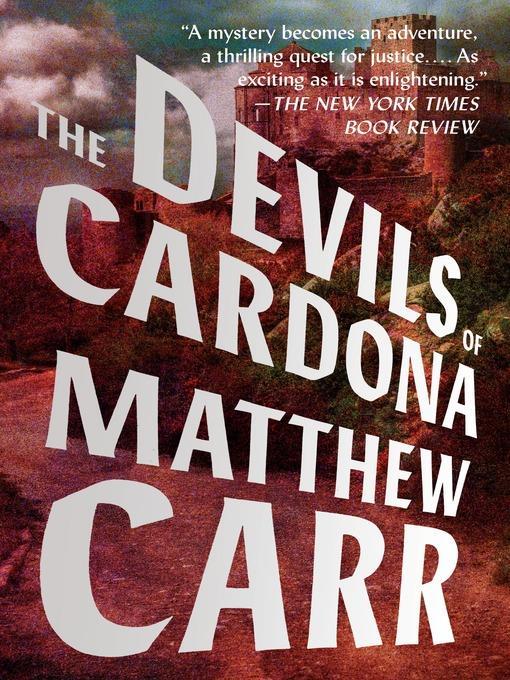
The Devils of Cardona
کتاب های مرتبط
- اطلاعات
- نقد و بررسی
- دیدگاه کاربران
نقد و بررسی

April 25, 2016
Depicting a 16th-century Spain rife with zealotry and Machiavellian scheming, Carr’s fiction debut is a satisfying effort. Carr (Blood and Faith: The Purging of Muslim Spain) is an expert on the region’s history of religious tensions and puts that knowledge to good use here. The novel begins with the gruesome murder of a lecherous priest in Aragon, a mountainous territory in northeastern Spain. Though the inhabitants of Aragon “like to run their affairs without interference from the Crown,” the Spanish king appoints a special justice, Bernardo de Mendoza, to investigate. Mendoza quickly assembles his team, two seasoned soldiers and a young page in his care, who throughout their inquiry contend with a host of unsavory characters: mountain bandits; an ambitious and villainous priest of the Inquisition; a nobleman attempting to strong-arm the widowed Countess of Cardona into marrying his depraved son; and finally a shadowy figure, the Redeemer, executing a series of heinous crimes supposedly in support of Spain’s Moriscos, Muslims who converted, often with little choice, to Christianity. The murdered priest is the first of many victims, but with each new atrocity the Redeemer’s motivation becomes harder to divine. All the elements for a spine-tingling thriller are here, though Carr doesn’t quite generate the expected drama in the progression of the mystery or its solution. The occasionally wooden dialogue (“You will explain yourself to me, villain”) doesn’t help either. Still, the novel has its redeeming qualities, not the least of which is a masterly recreation of a fascinating era.

April 15, 2016
Set in 16th-century Spain, this colorful detective story combines sex, violence, the Inquisition, and ambition-fueled intrigue that stretches from bailiffs to noblemen in high places. When an exceptionally vile priest is slain in his village church in 1584, the circumstances arouse fears that the area's converted Moors, or Moriscos, are being incited to revolt against Christianity by a man calling himself the Redeemer. Leading the murder investigation is a criminal judge named Bernardo de Mendoza, a 34-year-old veteran of the anti-Moor battle of Lepanto and the Granada War. Along with his teenage scribe, Gabriel, whom he rescued in Granada, and a lusty, hard-fighting cousin named Luis de Ventura, Mendoza travels to the Pyrenees village of Belamar de la Sierra in the Cardona region of Aragon to dig into a case that grows more complicated by the day. A key figure is the beautiful widowed Countess of Cardona, who controls politically important territory but lacks a male heir. Yet she still fends off marriage proposals from the nasty son of the nastier Baron Vallcarca--especially unwelcome for a juicy reason that shan't be revealed here. Unlike the Monty Python gag, everyone in Aragon expects the Spanish Inquisition, which frequently comes onstage to torture confessions out of invariably innocent perps. As more murders and motives emerge, the priest's demise proves to be only a small piece in a religious, political, and sexual jigsaw. Carr (Fortress Europe, 2012, etc.), a journalist and historian, lets out the stays for his meandering fiction debut, getting a tad melodramatic here and there but without ripping any bodices. He has a strong character in Mendoza as well as good sidekicks in gawky Gabriel and the usefully reckless Ventura. The author has written nonfiction books about terrorism and repression, and contemporary parallels may be found in this novel, but it stands well on its own as an entertaining historical mystery.
COPYRIGHT(2016) Kirkus Reviews, ALL RIGHTS RESERVED.

May 1, 2016
Carr, whose nonfiction includes Blood and Faith: The Purging of Muslim Spain (2009), returns to this subject and to the Inquisition in his debut novel, a historical mystery set in Aragon in 1584. The mystery centers on the murder of a debauched priest (the opening scene very economically shows his habitual intake of sin, after he kicks his maid out of bed and copes with a hangover before saying Mass). Everyone in the town of Belamar de la Sierra hated the priest, it seems, especially the Moriscos, Muslims who converted, thanks to the coercion common at the time, to Christianity. Philip II sends magistrate Bernardo de Mendoza to investigate the murder and also rumors of a planned uprising. Mendoza encounters a town drenched in violence, with more being plotted. This book is far more history than mystery, which, given the complexity of the subject, can be very digressive. And, in showing the atrocities of the Inquisition, especially in the scenes devoted to an auto-da-fe and a public hanging, the writing gets grisly. For readers particularly interested in this tumultuous period.(Reprinted with permission of Booklist, copyright 2016, American Library Association.)

























دیدگاه کاربران